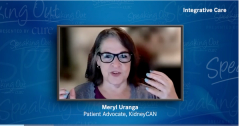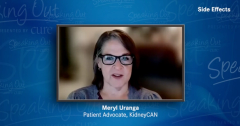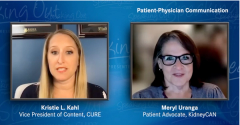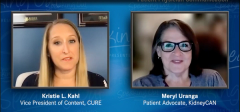
Integrative Care May Be Beneficial During Treatment for Kidney Cancer
As a part of its Speaking Out video series, on behalf of KidneyCAN, CURE® spoke with Meryl Uranga, a patient advocate, about integrative care for kidney cancer.
Kristie L. Kahl: How has integrative care helped you in your cancer journey? Moreover, what types of integrative care have you used?
Meryl Uranga: I think the way that it's helped me is that it puts you back in control a little bit of things that you can do. There's a lot of loss of control when you're diagnosed with cancer and you're really at a lot of people's mercy in terms of trusting them and understanding that you have to go through these steps and be treated and possibly (undergo) surgery. So, for me, it really added a lot of control to the situation. What can I do to lose my health care? What can I do for my mental health for my well-being? Or just in general that would complement these other evidence-based treatments.
So because it's such a difficult diagnosis, and just turns your world upside down, for me, there was a lot of anxiety and a lot of stress at the very beginning. I turned very early on to learning meditation, learning breathing techniques, that were very helpful to me when I get really overwhelmed or stressed and going through surgeries and pain and recovery and everything. So I leaned on that a lot early on and I still do when needed it was it's a good life skill to have, with or without cancer. Honestly just being able to really settle your mind and I got a lot of peace from learning those techniques.
I also, something I never thought I'd say because I've never been a particularly super active person, but I became very, very active and really turned to exercise. I think that partially because there's a lot of data that points to the fact that people who stay active during cancer treatments do a lot better. That's not a very scientific statement, but there's a lot of data and studies that have been done that show that so I thought this is something I can do. And I also found it to be very helpful with stress as well the endorphins and I just really got into it. I started walking and as I got in better shape and gotten further away from treatments, I started hiking, and now I'm biking. And I'm not sure if that falls under the category or not but it really it really has been so beneficial to me, probably the number one thing.
(I) also got into some supplements that I thought would boost my general health and immune system. All of this of course is run by our pharmaceutical people. Because of the drugs that I am on I've never gone out on my own. When I wasn't on treatment, I did some of that. But with treatment, I just want to state it's very important to run that by your care team run that by your pharmaceutical people, (physicians) usually get pharmaceutical people involved to make sure there's no negative interactions or anything but I found that making sure my vitamin D was high my vitamin B 12. Those are things that can affect your general health and your general ability to fight disease. So I did work on that.
And another big thing was my nutrition. Specifically, the microbiome which is getting a lot of attention now as just kind of the cornerstone of health for so many things. And regarding immunotherapy when I started the double immunotherapy, that was my first line treatment, there was a lot of information on record about the importance of the microbiome health before and that it was actually more effective. Most of the studies were around melanoma because immunotherapy was used for melanoma long before it was for other cancers, including kidney cancer. And so that's where a lot of the data came from, but to me it made sense that it would translate no matter what the cancer was. And I actually hired a coach that worked with me, she was a melanoma survivor who has an amazing response to immunotherapy, and she believed that the microbiome was part of it. And so, I worked really hard on that, changed my diet or ate a lot of fermented foods. Actually, interestingly, probiotics were not recommended, because that actually showed some negative effects. So it was all diet, it was all nutrition. But I highly recommend all of these types of modalities because of the fact that you feel like you're doing everything you can to support the medical treatment and give your body the best chance of having that work and be healthy and deal with the side effects better and just improve your general quality of life.
Kahl: Do you have advice or resources to help patients find which integrative care would be best suited for them? Or how to navigate the different types of integrative care?
Uranga: I think in this case, it would really be very personal in terms of what are you interested in? What do you what do you want to do? What would make you feel good? And I would add to that, to look at things like the studies on the microbiome or look at the data that's out there about how exercise improves outcomes in cancer. It's very motivating. You don't want to look back and say I should have done that. So, look around, do research, talk to people. Again, I have to point back to a (resource like) smart patient. That's where I got a lot of this data. And I wouldn’t have known, especially about the microbiome stuff. And then in my case, I did spend a little bit of money and got a coach that basically told me what to do and I felt there was credibility there because it was something she had already been through. I felt great about it, and I still do it because I'm still on immunotherapy and I'm still very cautious about that. But you also have to live your life and be happy because being happy goes a long way too so it's not like you want to deprive yourself forever and not do the things you enjoy because that may not be totally healthy all the time because mental health counts to unhappiness counts too. That's why the quality of life so important.
Transcription edited for clarity.








